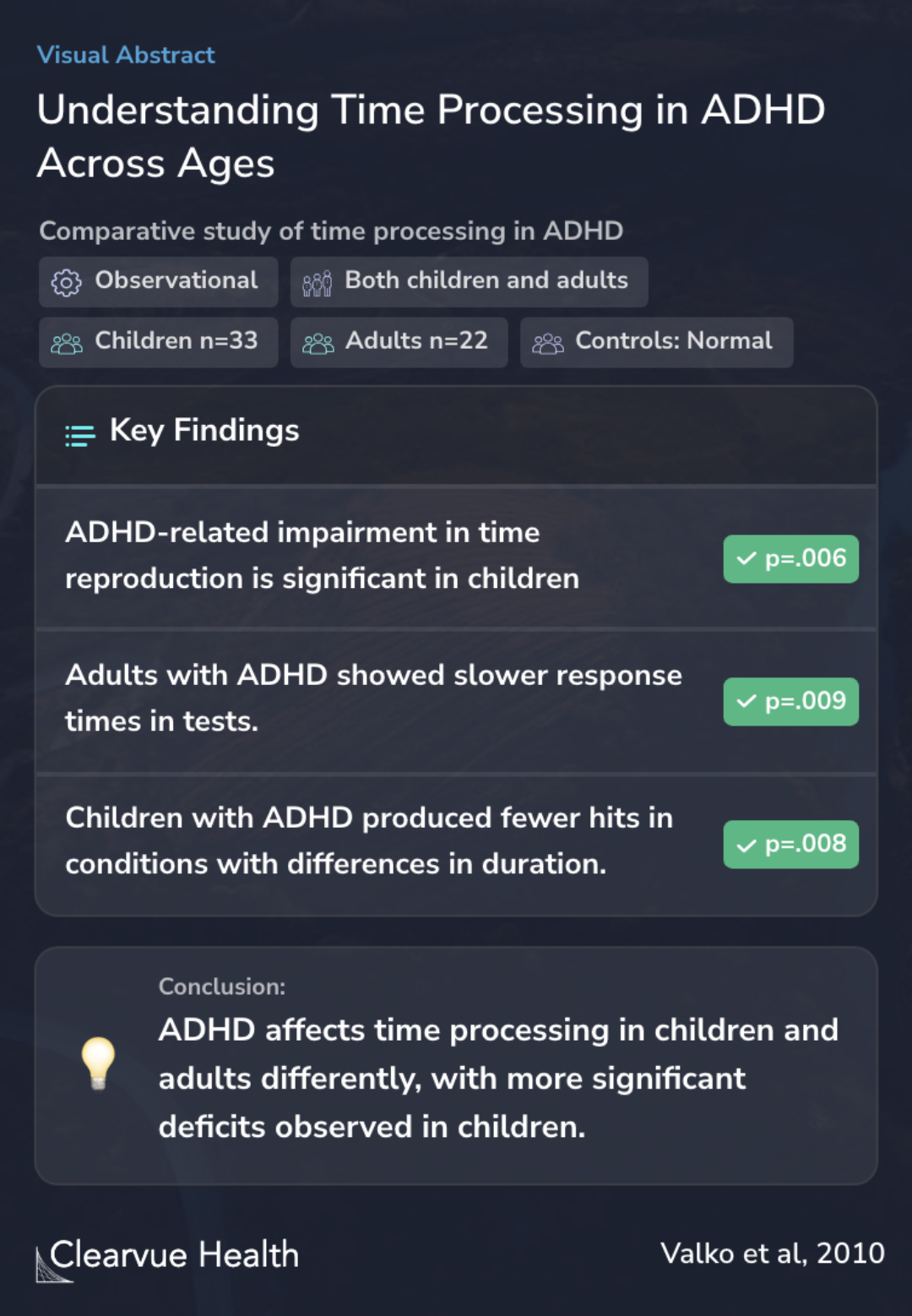Time processing in children and adults with ADHD
Understanding Time Processing in ADHD Across Ages
Lilian Valko, Gudrun Schneider, Mirko Doehnert, Ueli Müller, Daniel Brandeis, Hans-Christoph Steinhausen, Renate Drechsler

Objectives
The study's main objective is to explore the developmental trajectory of a proposed neuropsychological candidate endophenotype for Attention Deficit Hyperactivity Disorder (ADHD), specifically focusing on a time-processing deficit. This area of research is key in understanding the evolution of ADHD symptoms over time.
A time-processing deficit has been proposed as a neuropsychological candidate endophenotype for Attention Deficit Hyperactivity Disorder (ADHD), but its developmental trajectory still needs to be explored.
Methods
In this study, researchers compared children (N = 33) and adults (N = 22) diagnosed with ADHD to normal controls in two different time-processing tasks. The tasks were designed to assess impairments related to ADHD, not only across different age groups but also in comparison to individuals without the disorder.
For the time reproduction task, an overall ADHD-related impairment was observed in the entire group. However, this impairment was not as prominent when only adults were considered. This suggests a developmental aspect of how ADHD affects time processing. In the task of discriminating brief intervals, children and adults with ADHD exhibited varying patterns of deficits, indicating a complexity in the way ADHD affects time perception across different ages.
In the present study, children (N = 33) and adults (N = 22) with ADHD were compared to normal controls on two time-processing tasks. For time reproduction, ADHD-related impairment was found in the full group, but not when adults were analyzed separately. For the discrimination of brief i...
Results
The study's results highlight the nuanced nature of ADHD's impact on time processing. Children with ADHD showed a significant impairment in time reproduction. Adults with ADHD, on the other hand, displayed slower response times in tests, suggesting different manifestations of the disorder in various age groups. Additionally, children with ADHD produced fewer hits in conditions with varying durations, further illustrating the diverse effects of ADHD across different ages.
The research confirms that ADHD affects time processing differently in children and adults, an important insight for understanding and managing the condition.
For time reproduction, ADHD-related impairment was found in the full group, but not when adults were analyzed separately. For the discrimination of brief intervals, children and adults with ADHD showed different patterns of deficit.
Conclusions
The study concludes that ADHD impacts time processing in both children and adults, albeit in varying forms. This conclusion is strengthened by the larger body of research, which echoes the finding that ADHD presents differently across different age groups. The study's findings are significant as they add to the understanding of how ADHD symptoms evolve and manifest differently from childhood to adulthood.
These conclusions are important as they help to contextualize ADHD within a developmental framework, offering insights into the persistence and variation of symptoms over time.
We conclude that in ADHD some time-processing deficits are still present in adults, but may take on age-related different forms.
Context
This research builds on earlier findings, such as those by Barkley et al. (1997), which showed that children with ADHD have difficulties with time reproduction, especially under distraction. This earlier study found that ADHD children were less accurate in time reproduction tasks, highlighting the persistent nature of time perception impairments in ADHD.
Further, Biederman et al. (2000) suggest that while symptoms of ADHD tend to improve with age, many individuals still exhibit some symptoms into adulthood. This aligns with the current study's findings that ADHD continues to affect time processing in adults, albeit differently from children. This continuity and evolution of symptoms underscore the complexity of ADHD and its long-term implications.
In essence, the current study fits into a broader research context, enhancing our understanding of how ADHD symptoms, particularly those related to time processing, develop and change from childhood to adulthood.